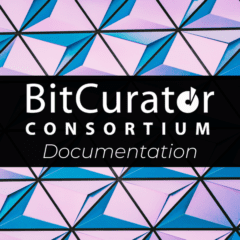
BitCurator Wiki
BitCurator Consortium
The BitCurator Wiki is the repository for community documentation on the BitCurator environment. It is maintained by the BCC Documentation & Training Committee.

The BitCurator Wiki is the repository for community documentation on the BitCurator environment. It is maintained by the BCC Documentation & Training Committee.
The BitCurator Consortium and the SAA Electronic Records Section invite digital curation practitioners and others who are curious to learn about the community to a mixer in conjunction with Archives*Records 2020. Drop in to talk to BitCurator users other and digital curation practitioners about born-digital … Read more →
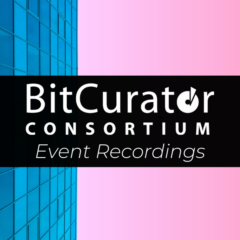
A discussion of different experiences mediating between software tools and born-digital materials and the ethical considerations of this work.
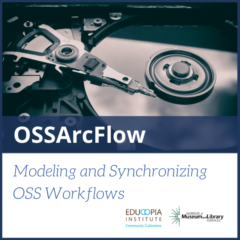
Educopia Institute is pleased to announce the release of the OSSArcFlow Resource Release Webinar. Last month, Educopia released the OSSArcFlow Guide to Documenting Born-Digital Archival Workflows. The publication of the Guide marks the culmination of a three-year project (OSSArcFlow) to investigate, synchronize, and model a … Read more →
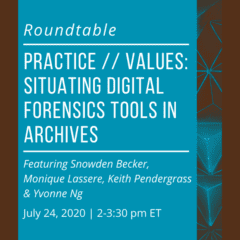
Registration is now open for the July 2020 BCC roundtable: practice // values : situating digital forensics tools in archives. The roundtable will take place on July 24, 2020 from 2:00-3:30pm ET over Zoom. Register here: https://www.eventbrite.com/e/practice-values-situating-digital-forensics-tools-in-archives-tickets-109992887688 Registration is required for this event, but it … Read more →

Educopia Institute is delighted to announce the release of the OSSArcFlow Guide to Documenting Born-Digital Archival Workflows. The Guide aims to make the daunting task of selecting, implementing, and refining born-digital archiving workflows more achievable. It was authored by Alexandra Chassanoff and Colin Post as … Read more →
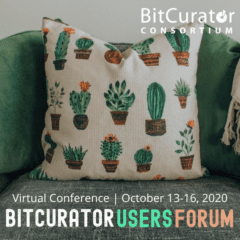
The BitCurator Users Forum Program Committee has decided to move the 2020 BitCurator Users Forum to a virtual conference format, which will take place on October 13-16, 2020. The committee took many factors into account in making this decision, including public health advisories, decisions other … Read more →
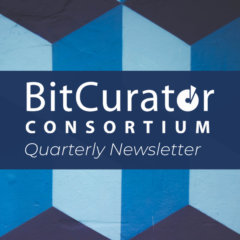
The latest issue of the BCC’s newsletter is now available! It includes: Updates from the BCC President Laura Alagna BitCurator Users Forum Call for Proposals Executive Council Nominations Upcoming roundtable Resources Roundup Updates from the BitCuratorEdu project

The Program Committee is excited to announce that we are now accepting proposals for remote conference presentations. We think that providing this option will increase participation and lead to a fuller, more engaging program. Perhaps most importantly, making participation in the Forum open to people … Read more →

The latest issue of the BCC’s newsletter is now available! It includes: Updates from the BCC Executive Council Save-the-date for the 2020 BitCurator Users Forum Updates from the BitCuratorEdu project

The latest issue of the BCC’s newsletter is now available! It includes: Greetings from the BCC’s new Community Facilitator BitCurator Users Forum community notes and recordings now available Call to join the Program Committee or submit a host site application Upcoming webinar: Bulk Reviewer Updates … Read more →
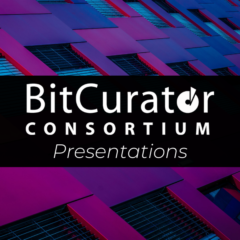
Levels and Practices of Born-Digital Access: Reports from the DLF Born-Digital Access Group Providing access to born-digital archival content presents a number of practical challenges, ranging from institution-specific workflows, to access and use policies, to a lack of clarity around researchers’ needs and desires. Compounding … Read more →

Gaining control of our legacy media backlog: appraisal of previously unmanaged born-digital material In this talk I will provide a case study of a project undertaken at Seton Hall University to address the backlog of legacy media containing the working and office files of the … Read more →

The Emperor’s New Grooves: Recognizing Multisession CD-ROM tracks not captured in disk images This talk will focus on two related optical media format types that cropped up in the mid-1990s through the 2000s: Enhanced Music and MultiSession CDs. The Enhanced Music CD format (or CD-Extra, … Read more →

Open session where people can ask questions to the entire audience. Anything goes! These could be questions related to workflows, policies, things you are struggling with, something you’d like some advice or guidance about.

The cultural heritage community has engaged with environmental sustainability in many areas, but is only beginning to explore the sustainability concerns of digital preservation activities. Building off of a recent American Archivist article (“Toward Environmentally Sustainable Digital Preservation”: https://doi.org/10.17723/0360-9081-82.1.165 or http://nrs.harvard.edu/urn-3:HUL.InstRepos:40741399), in which the authors … Read more →

Indiana University started using the BitCurator Environment in 2015 and by 2017 staff had deployed two dedicated workstations in our Born Digital Preservation Lab. The benefits of this approach are no doubt obvious to members of the BitCurator community: in addition to a pre-installed suite … Read more →

Have you ever wanted to customize the BitCurator environment? Thanks to decisions made by the BitCurator developers, modifications can be made quickly and easily using the open source configuration management software Salt. The talk will give an overview of how to make modifications to the … Read more →

One of the challenges of working with digital forensics tools, especially at the command line, is understanding how they are performing. Typically lacking user friendly status indicators and clear error messages, we often find ourselves wondering if these tools are working optimally or at all. … Read more →

In 2016, the Goddard Archives became custodians of approximately 7,000 optical disks that span a decade of Goddard Space Flight Center history, with more than one third of these CDs containing proprietary format image files. These proprietary CDs cover nine years and are high-risk, as … Read more →